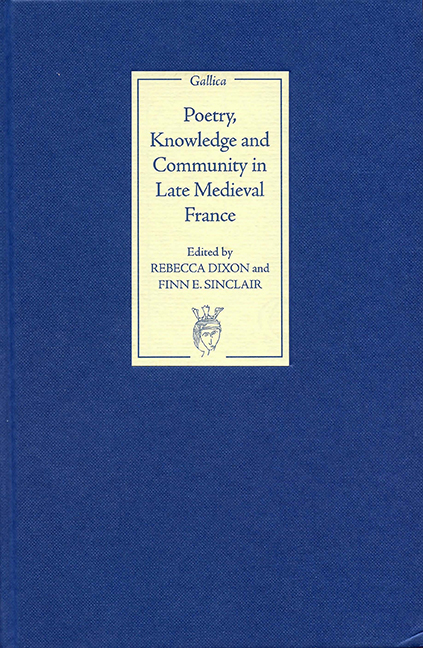Book contents
- Frontmatter
- Contents
- List of Illustrations
- List of Contributors
- Preface
- Introduction: L'Amour de Sophie. Poésie et savoir du Roman de la 1 Rose à Christine de Pizan
- PART I LEARNED POETRY/POETRY AND LEARNING
- 1 Poetry and the Translation of Knowledge in Jean de Meun
- 2 Apprendre à jouer? Fonctions de la partie d'échecs des Eschés amoureux
- 3 Jean Gerson, Poet
- 4 Gerson and Christine, Poets
- Part II Poetry or Prose?
- Part III Poetic Communities
- Conclusion: Knowing Poetry, Knowing Communities
- Bibliography
- Index
- Miscellaneous Endmatter
1 - Poetry and the Translation of Knowledge in Jean de Meun
from PART I - LEARNED POETRY/POETRY AND LEARNING
Published online by Cambridge University Press: 25 October 2017
- Frontmatter
- Contents
- List of Illustrations
- List of Contributors
- Preface
- Introduction: L'Amour de Sophie. Poésie et savoir du Roman de la 1 Rose à Christine de Pizan
- PART I LEARNED POETRY/POETRY AND LEARNING
- 1 Poetry and the Translation of Knowledge in Jean de Meun
- 2 Apprendre à jouer? Fonctions de la partie d'échecs des Eschés amoureux
- 3 Jean Gerson, Poet
- 4 Gerson and Christine, Poets
- Part II Poetry or Prose?
- Part III Poetic Communities
- Conclusion: Knowing Poetry, Knowing Communities
- Bibliography
- Index
- Miscellaneous Endmatter
Summary
Although Jean de Meun is best known to us through his spectacularly successful, endlessly seductive Roman de la Rose, it would seem by all accounts that the bulk of his career as a writer was devoted to translation, if we judge by the well-known statement he makes in the dedication of his translation of Boethius's Consolation of Philosophy to the King of France, Philip the Fair:
Je Jehan de Meun qui jadis ou Rommant de la Rose, puis que Jalousie ot mis en prison Bel Acueil, enseignai la maniere du chastel prendre et de la rose cueillir et translatay de latin en francois le livre Vegece de Chevalerie et le livre des Merveilles de Hyrlande et la Vie et les Epistres Pierres Abaelart et Heloys sa fame et le livre Aered de Esperituelle Amitie.
(Preface, lines 2–7; p. 168)[I, Jean de Meun, who previously in the Romance of the Rose, after Jealousy had imprisoned Bel Accueil, taught how to take the castle and pluck the rose, and translated from Latin into French the book of Vegetius on Chivalry and the book of the Marvels of Ireland (Topographica hibernica of Giraud de Barri) and the Life and Epistles of Peter Abelard and his wife Heloise and the book of Aelred on Spiritual Friendship (De amicitia spirituali of Aelred de Rievaulx).]
Now, as Rita Copeland has suggested, Jean's listing of his curriculum vitae in this spot has the effect of placing the Boethius translation in the context of Jean's vernacular production, thus making it function both in an interlingual manner (Latin to French) and an intralingual one, and thus stressing the importance and the authority of vernacularity itself. It also begs the question of the relative status of Jean's prose translations and that of the Roman de la Rose as a work of poetic translation. In what sense can we even consider the Rose a work of translation? How does Jean's use of poetry, that is rhymed verse, affect the nature of the translation, that is, the ‘transfer’ of knowledge from one linguistic context to another?
There is, of course, a special linkage between the Roman de la Rose and Jean's later translation of Boethius.
- Type
- Chapter
- Information
- Poetry, Knowledge and Community in Late Medieval France , pp. 19 - 41Publisher: Boydell & BrewerPrint publication year: 2008



